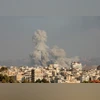Israeli strikes in Lebanon on Monday killed 492 people, marking the most serious conflict between the two nations since 2006. The attacks came a week after Hezbollah, a Lebanon-based militant group, suffered a setback when 5,000 of their pagers were remotely targeted, causing explosions that killed many and left thousands wounded.
In response to the latest strikes, Iran accused Israel of trying to widen the West Asian war, which began with the conflict between Israel and the Gaza-based militant group Hamas in October last year. Hezbollah, backed by Iran, supports Hamas and the Palestinian movement for the region's autonomy, which Israel opposes.
A New York Times report last week indicated that the pagers had been tampered with before being delivered to Hezbollah earlier this year, suggesting the attack, allegedly orchestrated by Israel, had been planned for a long time. Following the pager explosions, Israeli defence minister Yoav Gallant told his troops they were at the start of a “new phase of war” but did not mention anything about the attacks.
Also Read
Meanwhile, expressing concern at the situation, United Nations Secretary General Antonio Guterres said he did not want Lebanon to “become another Gaza”.
What did Netanyahu say about the latest Lebanon strikes?
Unfazed by the rising tensions in the region, Israeli Prime Minister Benjamin Netanyahu said on Monday: “I want to clarify Israel’s policy: we do not wait for the threat; we are ahead of it.” He also predicted “complicated days” ahead.
In Gaza, Israel has been conducting a ground operation against Hamas, which has resulted in more than 40,000 deaths of Hamas members and civilians, according to Gaza officials. Hamas runs the government in Gaza. However, a similar ground operation may not be imminent in Lebanon, as the Israeli military has stated that they are currently focused on an aerial campaign. The objective of this operation is “to degrade Hezbollah’s military capabilities.”
Iran’s response to potential Israel-Lebanon war:
Iran’s newly-elected President Masoud Pezeshkian said on Monday that they do not want to see the Gaza war expand to the Israel-Lebanon border. “They are dragging us to a point where we do not wish to go,” he said.
Pezeshkian blamed Israel for the pager explosions. He also denied claims that Iran had prior knowledge of Hamas' planned attack on southern Israel on October 7, which triggered the current war.
How did the US react to the Lebanon strikes?
Israel’s main ally, the United States, is sending additional troops to the region amid the increased risk of a wider conflict. Pentagon Press Secretary Pat Ryder refused to provide specific details.

)